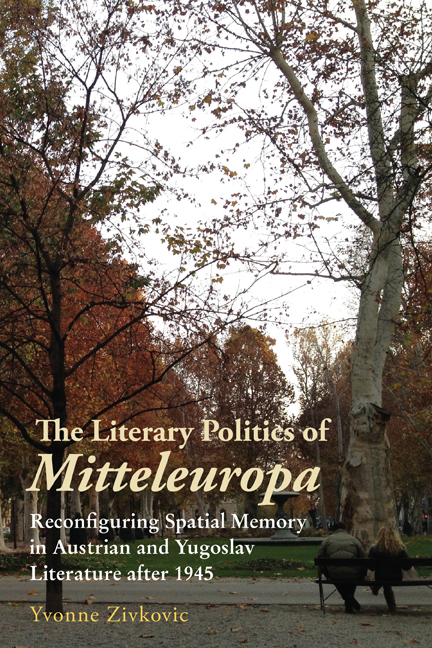 The Literary Politics of Mitteleuropa
The Literary Politics of Mitteleuropa Book contents
- Frontmatter
- Contents
- Acknowledgments
- Abbreviations and Note on Translations
- Introduction: Mitteleuropa as a Transnational Memory Discourse
- 1 The Legacy of Mitteleuropa: Between Geopolitics and Geopoetics
- 2 Ingeborg Bachmann and Peter Handke: The Austrian Mitteleuropa
- 3 Mitteleuropa as Conflicted Community in the Writings of Danilo Kiš and Aleksandar Tišma
- 4 Mitteleuropa after 1989: New Memory Challenges in Christoph Ransmayr and Dubravka Ugrešić
- Conclusion: Mitteleuropa Literature in the Twenty-First Century: Revisiting the Promise of Border-Crossing
- Bibliography
- Index
3 - Mitteleuropa as Conflicted Community in the Writings of Danilo Kiš and Aleksandar Tišma
Published online by Cambridge University Press: 23 March 2021
- Frontmatter
- Contents
- Acknowledgments
- Abbreviations and Note on Translations
- Introduction: Mitteleuropa as a Transnational Memory Discourse
- 1 The Legacy of Mitteleuropa: Between Geopolitics and Geopoetics
- 2 Ingeborg Bachmann and Peter Handke: The Austrian Mitteleuropa
- 3 Mitteleuropa as Conflicted Community in the Writings of Danilo Kiš and Aleksandar Tišma
- 4 Mitteleuropa after 1989: New Memory Challenges in Christoph Ransmayr and Dubravka Ugrešić
- Conclusion: Mitteleuropa Literature in the Twenty-First Century: Revisiting the Promise of Border-Crossing
- Bibliography
- Index
Summary
THIS CHAPTER EXAMINES the role of the Mitteleuropa debate in Yugoslavia through two of the most prominent Yugoslav authors associated with it, Danilo Kiš and Aleksandar Tišma. It places their participation in the relational network of Central Europe in context with the spatial imaginaries in their writings. Close readings of Kiš's and Tišma's prose texts and interviews between 1960 and 1990 reveal their literary mappings of Central Europe as a topography of loss and destruction beginning long before Kundera observed the systemic erasure of cultural memory. They share many common features with the Austrian authors already discussed, but also demonstrate how the debate was prefigured in postwar Yugoslavia long before its peak in the 1980s.
As Yugoslav Jewish writers from the border region of the Vojvodina, Kiš and Tisma conceived of Central Europe as a liminal space vulnerable to violent upheaval, a cultural melting pot located at the intersection of multiple conflicting territorial claims. Despite their common mixed ethnic heritage, their upbringing in the multilingual Vojvodina border province, and their shared experience of the Holocaust, their writings have not been discussed comparatively so far. This may be due to the generational gap between the two authors (Kiš was born in 1935, Tišma in 1924), or because Kiš, who was first and more widely translated into French, German, and English, had already earned an international reputation by the time of his death in 1989. After he permanently settled in Paris in 1979, the French translations of his work introduced him to a wider audience and thus prepared the path for friendships with notable international literary figures such as Milan Kundera, Susan Sontag, and Joseph Brodsky. In January 1986, he was invited to the 48th PEN congress in New York City, where several authors of the Mitteleuropa debate (next to Miłosz and Konrád, also the Polish author Ryszard Kapuściński) were received with great interest.
On the other hand, Tišma, a journalist and writer living in Novi Sad since the 1950s, only became more widely known in Europe from the late 1980s and has received very little critical attention in the anglophone sphere despite a steady number of translations that were produced since the 1970s, most importantly his Holocaust-themed novels, Knjiga o Blamu (1971; published in English as The Book of Blam, 1988) and Upotreba Čoveka (1976, in English as The Use of Man, 1998).
- Type
- Chapter
- Information
- The Literary Politics of MitteleuropaReconfiguring Spatial Memory in Austrian and Yugoslav Literature after 1945, pp. 163 - 222Publisher: Boydell & BrewerPrint publication year: 2021


